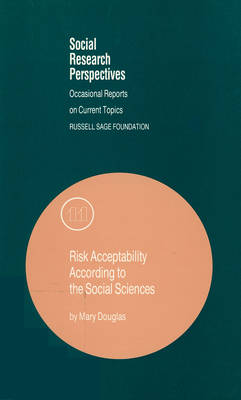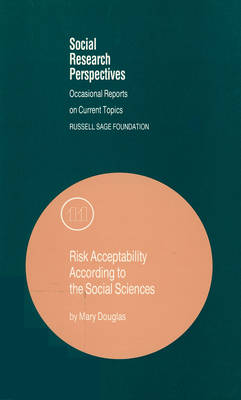
- Afhalen na 1 uur in een winkel met voorraad
- Gratis thuislevering in België vanaf € 30
- Ruim aanbod met 7 miljoen producten
- Afhalen na 1 uur in een winkel met voorraad
- Gratis thuislevering in België vanaf € 30
- Ruim aanbod met 7 miljoen producten
Zoeken
Omschrijving
Every day, it seems, we become aware of some new technological or chemical hazard. Yet it is also possible that this very awareness is new, or at least newly heightened. Why are certain kinds of risks suddenly so salient? Are public perceptions of risk simply the sum of individual reactions to individual events, or do social and cultural influences play a role in shaping our definitions of safety, acceptable risk, and danger? Prompted by public outcries and by the confusion and uncertainty surrounding risk management policy, social scientists have begun to address themselves to the issue of risk perception. But as anthropologist Mary Douglas points out, they have been singularly reluctant to examine the cultural bases of risk perception, preferring to concentrate on the individual perceiver making individual choices. This approach leaves unexamined a number of crucial social factors--our concepts of what is "natural" or "artificial," for example; our beliefs about fairness, and our moral judgements about the kind of society in which we want to live. This provocative and path-breaking report seeks to open a sociological approach to risk perception that has so far been systematically neglected. Describing first some exceptions to the general neglect of culture, Douglas builds on these clues and on her own broad anthropological perspective to make a compelling case for focusing on social factors in risk perception. She offers a challenge and a promising new agenda to all who study perceptions of risk and, by extension, to those who study human cognition and choice as well. "An altogether brilliant piece of writing--far-reaching and a joy to read." --Amartya Sen, Oxford University A Volume in the Russell Sage Foundation's Social Science Frontiers Series
Specificaties
Betrokkenen
- Auteur(s):
- Uitgeverij:
Inhoud
- Aantal bladzijden:
- 121
- Taal:
- Engels
- Reeks:
- Reeksnummer:
- nr. 11
Eigenschappen
- Productcode (EAN):
- 9780871542113
- Verschijningsdatum:
- 1/05/1986
- Uitvoering:
- Paperback
- Formaat:
- Trade paperback (VS)
- Afmetingen:
- 142 mm x 226 mm
- Gewicht:
- 181 g

Alleen bij Standaard Boekhandel
+ 64 punten op je klantenkaart van Standaard Boekhandel
Beoordelingen
We publiceren alleen reviews die voldoen aan de voorwaarden voor reviews. Bekijk onze voorwaarden voor reviews.








